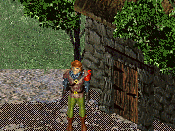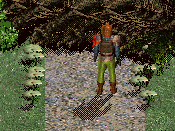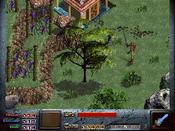Quest for Food (The)
Upon initially encountering "The Quest for Food" in the listing on this site, I assumed it would be somewhat in the same vein as "The Quest for Cheese" due to it being similarly titled and because cheese is a type of food. Instead I soon found out that was not the case at all and that my leap of logic had cost me dearly in terms of what I could have been doing otherwise.
Instead I was presented with a rather short encounter involving a barricade of logs that can only be moved by a local woman. The only other character is a local man who is incredibly unhelpful and uncooperative and provides no assistance to the player. After this is out of the way, one traverses to a cavern of sorts, swarming with bugs, and then afterwards finds the wizard "Huldrum" who is hoarding all the food for whatever reason. After defeating him, the game ends and Dink finds himself with all the food that was apparently stolen from him.
As is usual in GlennGlenn's games, there is some sort of underlying social commentary present throughout. For example in the case of the log-moving, only Jessica is capable of shifting the logs to clear the way for Dink to get to the evil wizard. Why can't Dink or the unnamed male NPC perform this task? It appears GlennGlenn's attempt here is to inject aspects of feminist doctrine into the storyline. The subsequent section involving the defeat of the wizard to reclaim the food is also very much a commentary on wealth inequality. How are we to know with certainty that Huldrum actually stole the food? Could he not have owned it legitimately? The player is forced to rely on Jessica for information, and as she is quite clearly a feminist, there's a heavy chance she is biased and that Huldrum is being unfairly targeted. The choice to depict the final fight as occurring on an island is perhaps a nod to the ostracism that Huldrum has endured throughout his life right up to his untimely demise. Had this been released during the Occupy Wall Street protests it could have provoked quite the discussion, but it was not and thus falls flat and shall be forever left unexplored.
Instead I was presented with a rather short encounter involving a barricade of logs that can only be moved by a local woman. The only other character is a local man who is incredibly unhelpful and uncooperative and provides no assistance to the player. After this is out of the way, one traverses to a cavern of sorts, swarming with bugs, and then afterwards finds the wizard "Huldrum" who is hoarding all the food for whatever reason. After defeating him, the game ends and Dink finds himself with all the food that was apparently stolen from him.
As is usual in GlennGlenn's games, there is some sort of underlying social commentary present throughout. For example in the case of the log-moving, only Jessica is capable of shifting the logs to clear the way for Dink to get to the evil wizard. Why can't Dink or the unnamed male NPC perform this task? It appears GlennGlenn's attempt here is to inject aspects of feminist doctrine into the storyline. The subsequent section involving the defeat of the wizard to reclaim the food is also very much a commentary on wealth inequality. How are we to know with certainty that Huldrum actually stole the food? Could he not have owned it legitimately? The player is forced to rely on Jessica for information, and as she is quite clearly a feminist, there's a heavy chance she is biased and that Huldrum is being unfairly targeted. The choice to depict the final fight as occurring on an island is perhaps a nod to the ostracism that Huldrum has endured throughout his life right up to his untimely demise. Had this been released during the Occupy Wall Street protests it could have provoked quite the discussion, but it was not and thus falls flat and shall be forever left unexplored.
















